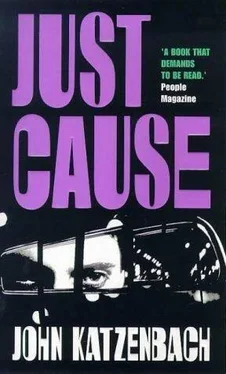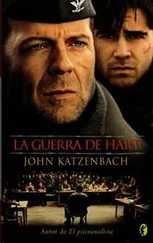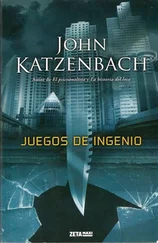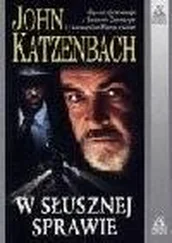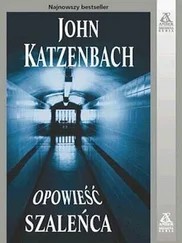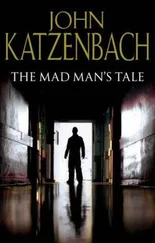John Katzenbach - Just Cause
Здесь есть возможность читать онлайн «John Katzenbach - Just Cause» весь текст электронной книги совершенно бесплатно (целиком полную версию без сокращений). В некоторых случаях можно слушать аудио, скачать через торрент в формате fb2 и присутствует краткое содержание. Жанр: Триллер, на английском языке. Описание произведения, (предисловие) а так же отзывы посетителей доступны на портале библиотеки ЛибКат.
- Название:Just Cause
- Автор:
- Жанр:
- Год:неизвестен
- ISBN:нет данных
- Рейтинг книги:4 / 5. Голосов: 1
-
Избранное:Добавить в избранное
- Отзывы:
-
Ваша оценка:
- 80
- 1
- 2
- 3
- 4
- 5
Just Cause: краткое содержание, описание и аннотация
Предлагаем к чтению аннотацию, описание, краткое содержание или предисловие (зависит от того, что написал сам автор книги «Just Cause»). Если вы не нашли необходимую информацию о книге — напишите в комментариях, мы постараемся отыскать её.
Just Cause — читать онлайн бесплатно полную книгу (весь текст) целиком
Ниже представлен текст книги, разбитый по страницам. Система сохранения места последней прочитанной страницы, позволяет с удобством читать онлайн бесплатно книгу «Just Cause», без необходимости каждый раз заново искать на чём Вы остановились. Поставьте закладку, и сможете в любой момент перейти на страницу, на которой закончили чтение.
Интервал:
Закладка:

John Katzenbach
Just Cause
ONE. Prisoners
When you win the prize they tell you a joke: Now you know the first line of your own obituary.
1. A Man Of Opinions
On the morning that he received the letter, Matthew Cowart awakened alone to a false winter.
A steady north wind had picked up after midnight and seemed to push the nighttime black away, smearing the morning sky with a dirty gray that made a lie of the city's image. As he walked from his apartment to the street outside, he could hear the breeze rattle and push at a palm tree, making the fronds clash together like so many swords.
He hunched his shoulders together tightly and wished that he'd worn a sweater beneath his suit coat. Every year there were a few mornings like this one, filled with the promise of bleak skies and blustery winds. Nature making a small joke, causing the tourists on Miami Beach to grumble and walk the sandy stretches in their sweaters. In Little Havana, the older Cuban women would wear heavy woolen overcoats and curse the wind, forgetting that in the summer they carried parasols and cursed the heat. In Liberty City, the rat holes in the crack houses would whistle with cold. The junkies would shiver and struggle with their pipes. But soon enough the city would return to sweaty, sticky normalcy.
One day, he thought as he walked briskly, perhaps two. Then the warm air will freshen out of the South and we will all quickly forget the cold.
Matthew Cowart was a man moving light through life.
Circumstances and bad luck had cut away many of the accoutrements of impending middle age; a simple divorce had sliced away his wife and child, messy death his parents; his friends had slid into a separate existence defined by rising careers, squads of young children, car payments, and mortgages. For a time there had been attempts by some to include him in outings and parties, but, as his solitude had grown, accompanied by his apparent comfort in it, these invitations had fallen off and finally stopped. His social life was defined by an occasional office party and shop talk. He had no lover and felt a vague confusion as to why he didn't. His own apartment was modest, in a sturdy high-rise overlooking the bay, built in the 1950s. He had filled it with old furniture, bookcases stuffed with mystery novels and true crime nonfiction, chipped but utilitarian dinnerware, a few forgettable framed prints hanging on the walls.
Sometimes he thought that when his wife had taken their daughter, all the color had fled from his life. His own needs were satisfied by exercise – an obligatory six miles a day, running through a downtown park, an occasional game of pickup basketball at the YMCA and his job at the newspaper. He felt possessed of a remarkable freedom yet somehow worried that he had so few recognizable debts.
The wind was still gusting hard, pulling and tugging at a trio of flags outside the main entrance to the Miami Journal. He paused momentarily, looking up at the stolid yellow square building. The paper's name was emblazoned in huge red, electric letters against one wall. It was a famous place, well known for its aggressiveness and power. On the other side, the paper looked over the bay. He could see wild waters splashing up against the dock where huge rolls of newsprint were unloaded. Once, while sitting alone in the cafeteria eating a sandwich, he'd spotted a family of manatees cavorting about in the pale blue water, no more than ten yards from the loading dock. Their brown backs burst through the surface, then fell back beneath the waves. He'd looked about for someone to tell but had found no one, and had spent the next few days, at lunch, staring constantly out at the shifting blue-green surface for another glimpse of the animals. It was what he liked about Florida; the state seemed cut from some jungle, which was always threatening to overtake all the development and return it to something primeval. The paper was forever doing stories about twelve-foot alligators getting trapped on entrance ramps to the interstate and stopping traffic. He loved those stories: an ancient beast confronting a modern one.
Cowart moved quickly through the double doors that led to the Journal's newsroom, waving at the receptionist who sat partially hidden behind a telephone console. Next to the entrance was a wall devoted to plaques, citations, and awards: a parade of Pulitzers, Kennedys, Cabots, Pyles, and others with more mundane names. He paused at a bank of mailboxes to pick up his morning mail, flipping rapidly through the usual handouts and dozens of press releases, political statements, and proposals that arrived every day from the congressional delegation, the mayor's office, the county manager's office, and various police agencies, all alerting him to some development that they thought worthy of editorial attention. He sighed, wondering how much money was wasted on all these hopeless efforts. One envelope, however, caught his eye. He separated it from the pile.
It was a thin, white envelope with his name and address written in sturdy block print. There was a return address in the corner, giving a post office box number in Starke, Florida, in the northern portion of the state. The state prison, he thought instantly.
He put it on top of the other letters and headed toward his office, maneuvering amidst the room of desks, nodding at the few reporters who were in early and already working the telephones. He waved at the city editor, who had his feet up on his desk in the center of the room and was reading the last edition. Then he moved through a set of doors in the rear of the newsroom marked EDITORIAL. He was halfway into his cubicle when he heard a voice from nearby.
'Ahh, the young Turk arrives early. What could bring you in before the hordes? Unsettled by the troubles in Beirut? Sleepless over the president's economic recovery program?'
Cowart stuck his head around a partition. 'Morning, Will. Actually, I just wanted to use the WATS line to call my daughter. I'll leave the truly deep and useless worrying to you.'
Will Martin laughed and brushed a forelock of white hair out of his eyes, a motion that belonged more to a child than an old man. 'Go. Abuse the abundant financial generosity of our beloved newspaper. When you get finished, take a look at the story on the Local page. It seems that one of our black-eyed dispensers of justice cut something of a deal for an old buddy caught driving under the influence. It could be time for one of your ever-popular crime-and-punishment crusades.'
'I'll look at it, Cowart said.
'Damn cold this morning,' said Martin. 'What's the point of living down here if you still have to shiver on the way to work? Might as well be Alaska.'
'Why don't we editorialize against the weather? We're always trying to influence the heavens, anyway. Maybe they'll listen to us this time.'
'You've got a point, Martin smiled.
'And you're just the man for the job, Cowart said.
'True, Martin replied. 'Not steeped in sin, like you, I have a much better connection to the Almighty. It helps in this job.'
'That's because you're so much closer to joining him than I.'
His neighbour roared. 'You're an ageist, he protested, waggling a finger. 'Probably a sexist, a racist, a pacifist – all the other ists, too.'
Cowart laughed and headed to his desk, dumping the pile of mail in the middle and leaving the single envelope on top. He reached out for it, while with the other hand he started dialing his ex-wife's number. With any luck, he thought, they should be at breakfast.
He crooked the receiver beneath his shoulder and ear, freeing his hand while the connection was being made. As the telephone began ringing he opened the envelope and took out a single sheet of yellow legal-ruled paper.
Читать дальшеИнтервал:
Закладка:
Похожие книги на «Just Cause»
Представляем Вашему вниманию похожие книги на «Just Cause» списком для выбора. Мы отобрали схожую по названию и смыслу литературу в надежде предоставить читателям больше вариантов отыскать новые, интересные, ещё непрочитанные произведения.
Обсуждение, отзывы о книге «Just Cause» и просто собственные мнения читателей. Оставьте ваши комментарии, напишите, что Вы думаете о произведении, его смысле или главных героях. Укажите что конкретно понравилось, а что нет, и почему Вы так считаете.
